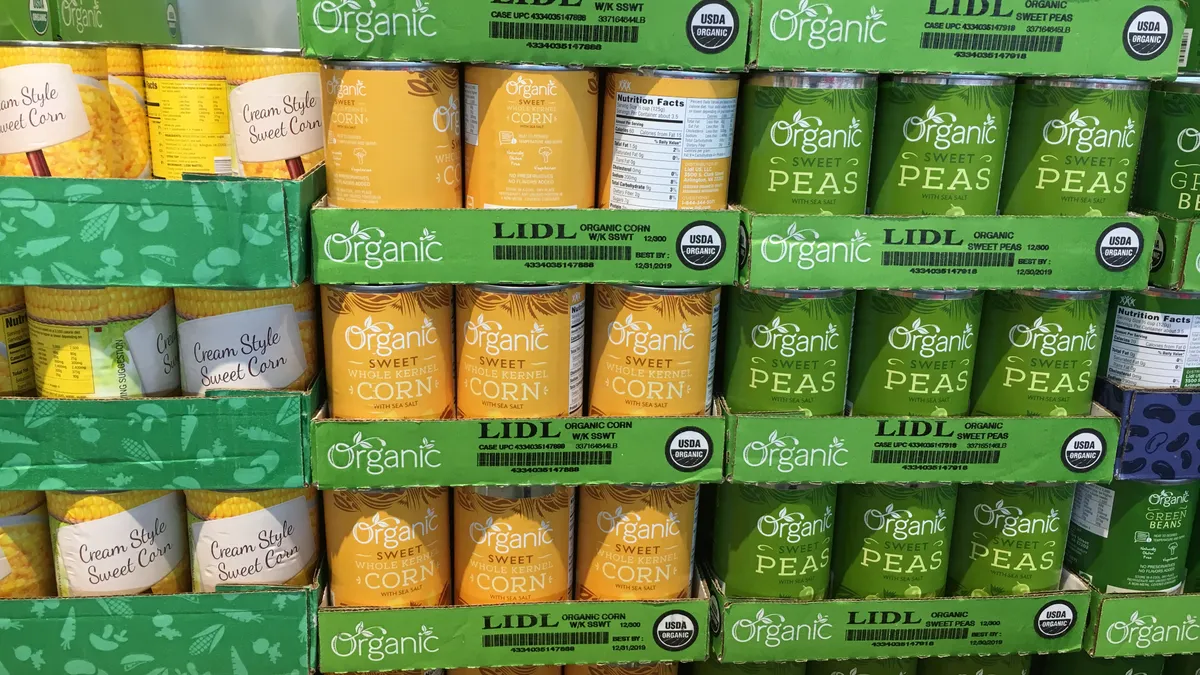Dive Brief:
-
Private label brands are growing three times faster than national brands, but the big bucks lie in premium ones, according to a Nielsen report. Premium private label sales account for nearly one-third of dollar volume and drove 8% of the growth in the segment in 2017.
-
Store brand dollar sales year-over-year increased eightfold — to 3.2% from 0.4% — making up $125 billion in sales across all traditional grocery stores.
-
Consumers no longer correlate value with cheap, but customize value based on personal preference of ingredients, manufacturing techniques, price and durability, the report said.
Dive Insight:
Grocers prefer private label brands because they have more control of what goes into the products, according to the National Retail Federation's Stores magazine. They cut out middle-man costs, give retailers the ability to raise national brand prices and increase customer loyalty. They can also use that control to draw specific attention to their products, rolling out sleeker packaging that looks more high-end than national brand counterparts — especially to target millennials, who have less brand loyalty than older generations.
Costco is a prime example. The stores might offer massive portions, but they don’t offer massive options — though one is always the company’s Kirkland Signature brand. The premium private brand makes up about 25% of Costco’s sales, according to a Market Realist report — above the industry average of 17% from private label sales.
Once targeting financially conservative customers, private label brands have reformulated to include organic, gluten free, all-natural and prepared foods. Consumers are increasingly on the hunt for clean label products that are healthy and socially conscious. According to Nielsen, clean label products had total sales of $131 billion in 2017, and private brands made up about 17% of dollar share.
Retailers have adopted these trends with their private label brands, taking the opportunity to turn these consumers toward their premium products. Kroger’s Simple Truth line is free of 101 components that concern the retailer’s customers. The company’s private label brands bring in more than $20 billion a year, and $2 billion comes from Simple Truth. Aldi, which sells mostly private label brands in its stores,has several premium-tier brands, including gluten-free private label LiveGFree, organic SimplyNature, and Little Journey for baby products.
The increase of premium private labels brings tough competition between retailers. Since Amazon’s acquisition of Whole Foods, the natural and organic grocer's private 365 brand is not only sold at its stores, but also on Amazon's online offerings. The brand raked in $11 million on Amazon in just the few months it was available in 2017. And as Amazon becomes more ubiquitous in the grocery space, this may squeeze out other retailers' shot at attracting consumers with their private brands.
Private labels are estimated to be every one in five products sold in U.S. supermarkets in 2016. That’s approximately $150 million in supermarket sales, according to Nielsen. While this is a significant amount, there is still room for growth — good news for both national brands trying to keep market share and grocers trying to further innovate in private label.










